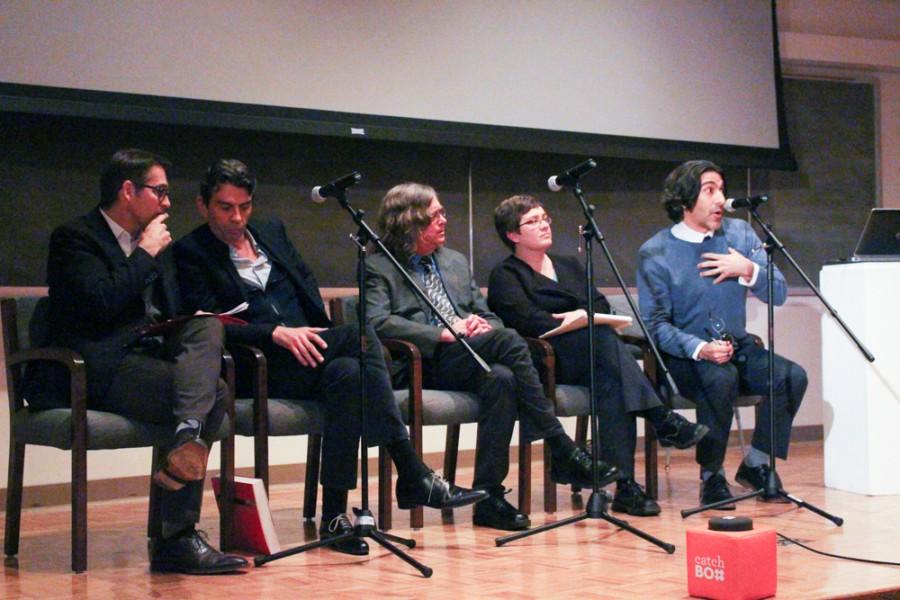Eighth Annual Global Studies Symposium
February 11, 2016
Students and faculty packed themselves into Olin 130 to hear the Global Study Symposium speeches regarding Human Zoos: Photography, Race, and Empire, on February 5th. The symposium featured speeches from guest-speakers Pascal Blanchard, Dominic Thomas, and Stephen Sheehi. Whitman professors and students also spoke at the symposium too. At the end, there was a Q&A where audience members could ask any question related to the topic to the Whitman professors and guest speakers. The professors involved in the Global Studies Symposium hope to continue the conversation with 12 events they will put on later this semester. “.
Whitman’s professors began contemplating the idea of a global studies program ten-years-ago. They decided on a global studies program because they could look more at the world’s cultures whereas simply having an international studies program would have limited them more to only looking at the world’s nations.
“The idea was that these courses would be cross-disciplinary and team-taught so that students could see in front of them how interdisciplinarity works because we wanted Global Studies to not only be global, but we wanted to show how different disciplines approach the same question or even raise different questions,” said Elyse Semerdjian, Associate Professor of History and Director of the Global Studies Symposium.
The most important takeaway from the Symposium was that colonialist ideology still colors how whites view people of color to this very day said Lisa Uddin, Assistant Professor of Art History and Visual Culture Studies.
“I think an exposure and hopefully a deeper understanding of how entrenched our habits of racial thinking are. What might seem like the bad, old days of ethnographic display circa 1900 are not discontinuous with habits of representing racial difference today. I hope that students will think about what it means to be human, historically and today. And all the messy, messy processes through which that designation gets fixed and unfixed,” said Uddin.
This year’s symposium brought human zoos under the examination of that interdisciplinary lens. In human zoos across the United States and Europe, indigenous populations from all around the world were made to perform circus-like entertainment acts to hundreds of millions of white visitors. These acts reinforced the strong feelings of nationalism and the strict racial hierarchy that defined much of the nineteenth and early twentieth centuries.
“Human zoos were…an indispensable stepping-stone in comprehending the process of the radicalization of the public eye and the ideas of the West,” said historian, researcher at the Laboratoire Communication et Politique and co-director of the documentary “Human Zoos,” Pascal Blanchard.

Several speakers at the symposium agreed that science and many of society’s other thought processes are still laced with racialized logic of earlier eras. They warned the audience not be in complacent by assuming that racism was somehow overcome in the past.
“We must resist the urge to say that this is just a historical phenomenon. The Global Studies Symposium seeks to provoke a conversation about the implications for the present. We see our sensibilities as so different from our Victorian ancestors, yet the residual effects of Victorian race thinking surrounds us,” said Semerdjian.
Even the supposedly well-intentioned drive for increasingly diversity at Whitman College has some problematic assumptions regarding race. According to Assistant Professor of Politics Susanne Beechey, a big issue with diversity is that it mostly exists for the education and happiness of white students.
“I’m particularly interested in the ways in which the pedagogy of the human zoo might persist in places like Whitman College. When I say pedagogy of the human zoo, I’m thinking about the desire to learn by gazing at real, live specimens of human difference…Certainly, it is a problem to speak for the other, yet it is also a problem to ask the other to perform under a conditions not of their making, for the pleasure and edification of others,” said Beechey.
Professor of Religion Jonathan Walters built on the ideas of Semerdjian and Beechey by saying that the only way to move beyond racism would be to talk about how human zoos have and continue to hurt people of color.
“This global family therapy cannot be avoided. Despite our collective silence, the zoos did not just go away. For one thing, they continued to have a material presence in our world… More perniciously, the ideological content of the zoos and the practices they socialized, likewise have not been destroyed, but preserved and transformed,” said Walters.
The speech by student-speaker, senior Suzy Xu, pointed out that even today intellectual pursuits, such as science, cannot be fully separated from the influences of society.
“The direction and the practice of science can never be isolated from the social, economic and political characteristics of the era in which the scientific research was conducted,” said Xu.
While many topics related to past and current manifestations of racism were covered at the Global Studies Symposium, Semerdjian wants to continue the discussion to the 12 other events being put on by the Symposium this semester.
“Global Studies is putting on 13 events total this semester, each offers an opening for people to continue discussing colonial racism and representation. The Symposium was just the conversation starter,” said Semerdjian to The Pioneer via email.







